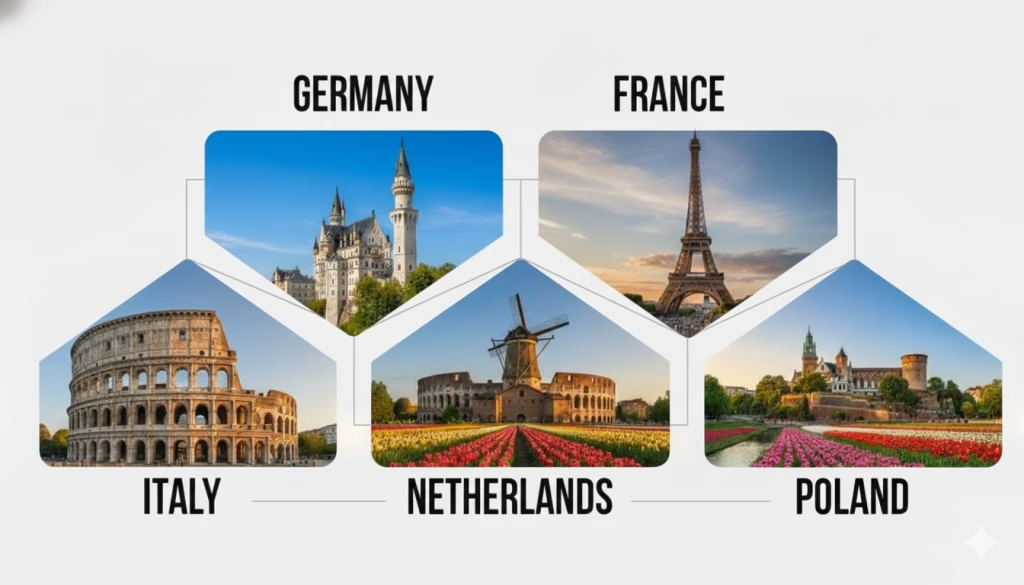Introduction
Choosing the best location to start a company is rarely about a single factor. Entrepreneurs weigh corporate tax, tax incentives, market access, workforce quality and the ease of company formation — and Europe offers strikingly different advantages from country to country.
This article compares five carefully selected European countries for 2025 — Italy, France, Germany, Poland and Norway — using a consistent methodology: headline corporate tax rate, business incentives, company formation processes, visa/residency options and the most promising sectors for investment.
Europe’s diverse economic landscape means some nations are ideal for innovation and R&D, others for manufacturing clusters or access to specialised talent pools. While one country may offer low nominal tax rates, another can be superior thanks to targeted tax incentives, grants or a simpler formation process that accelerates time to market.
So, which of these european countries is the right fit for your business plans in 2025?
Below we outline practical, up-to-date points you can act on: comparative corporate tax notes, typical company formation steps and timelines, available tax incentives and visa or residency pathways for founders and investors. Use this as a decision framework — and if you want a tailored recommendation, there’s a quick checklist and a downloadable comparison table later in the article.
For quick reference on corporate tax and incentives across these countries, see our linked resource on corporate tax policies — it provides context for common schemes (note: the linked article addresses wider EU/European corporate tax themes even if it mentions countries outside this five).
List of Top 5 Countries for Business in Europe

1. Germany
Germany remains Europe’s economic powerhouse, with a large domestic market, advanced infrastructure and deep industry clusters in manufacturing, automotive and industrial tech. The country combines scale with strong R&D and workforce quality, making it attractive for established businesses and scale‑ups.
Key Benefits
- Large, wealthy market: Germany’s economy provides scale and strong B2B demand across manufacturing and industrial services.
- Advanced infrastructure & clusters: Excellent transport, logistics and regional clusters (Bavaria, Baden‑Württemberg) support supply chains and innovation.
- Skilled workforce: A highly trained labour force with strong vocational programmes supplies talent for technical sectors.
- R&D support: Grants, tax allowances and programmes (federal and Länder‑level) support technology and industry 4.0 projects.
Challenges:
- Relatively high overall tax burden for companies and employers (headline combined tax and social charges can push effective rates above headline corporate tax).
- Complex regional bureaucracy and labour regulations can lengthen the formation and hiring processes.
Best Sectors to Invest In
- Advanced manufacturing & automotive
- Industrial tech, automation & AI
- Renewable energy and cleantech
- Fintech and business services
Quick stats: Corporate tax generally ~15% federal + trade tax (municipal) → effective rate depends on location; company formation typically 1–3 weeks for an GmbH/SRL with preparation; strong R&D incentives and grants available.
2. France
France combines a large domestic market with generous R&D and innovation incentives. Paris is a leading tech hub in western europe, while regional clusters (Lyon, Grenoble) offer deep specialisations in biotech, advanced manufacturing and AI.
Key Benefits
- R&D tax credit (CIR): One of Europe’s most generous R&D tax incentives, reducing effective tax on qualifying innovation spending.
- Large consumer market: France’s sizeable internal market supports B2C scale and EU distribution.
- Access to talent and innovation hubs: Strong universities, incubators and public funding paths for startups.
- Founder‑friendly programmes: Young innovative company statuses and grants streamline support for startups.
Challenges:
- Payroll taxes and social charges can be significant for employers, increasing hiring costs.
- Administrative processes can be slower for certain permits; local compliance is essential.
Best Sectors to Invest In
- Biotech & pharmaceuticals
- AI, deep tech and R&D intensive sectors
- Luxury goods, fashion and design
- Green energy and mobility
Quick stats: Headline corporate tax around 25% (verify current rates for 2025); generous R&D tax credits (CIR); company formation online possible within days for an SAS/SARL but local formalities apply.
3. Italy
Italy is attractive for manufacturing, design, agri‑food and specialised industrial clusters (Moda, Automotive, Machinery). Regions such as Lombardy and Emilia‑Romagna host deep supplier networks and skilled trades, making Italy ideal for companies that need production know‑how and design excellence.
Key Benefits
- Manufacturing clusters & expertise: High concentration of SMEs, suppliers and specialised manufacturing skills.
- Tax incentives for innovation: Patent Box regimes and R&D credits support innovation and IP monetisation.
- Strategic EU location: Good logistics to Mediterranean and EU markets; competitive location for export‑oriented companies.
- Cost advantages for production: In selected regions, operating costs can be lower than in north‑west Europe.
Challenges:
- Regional bureaucracy and variability in regional incentives — local knowledge is important.
- Complex labour and tax compliance can slow initial setup without experienced local advisers.
Best Sectors to Invest In
- Manufacturing, machinery and advanced components
- Fashion, design and luxury goods
- Agri‑food and food technology
- Automotive supply chain and mobility solutions
Quick stats: Headline corporate tax varies with regional surtaxes; R&D credits and patent box options available; common company form SRL (limited liability) with formation often possible within 1–3 weeks with proper documentation.
4. Poland
Poland offers a cost‑competitive workforce, rapidly growing tech hubs (Warsaw, Kraków, Wrocław) and improving infrastructure. It is a popular choice for companies that need skilled software engineers, near‑shoring capabilities and favourable cost structures for scale.
Key Benefits
- Competitive labour costs: Lower salary base than western europe while offering strong engineering and IT talent.
- Growing tech ecosystem: Vibrant startup scene with accelerators, venture funds and international investors.
- Investment incentives: Special Economic Zones, R&D reliefs and IP‑friendly regimes encourage foreign direct investment.
- Ease of company formation: Modern registries and online filing speed up the process for a limited company (Sp. z o.o.).
Challenges:
- Smaller domestic market compared with western europe — export orientation is often required for scale.
- Occasional language and regulatory nuances require local counsel for compliance.
Best Sectors to Invest In
- Software development, IT outsourcing and SaaS
- Fintech and digital services
- Manufacturing relocation and advanced engineering
- Clean energy projects and smart city technologies
Quick stats: Competitive corporate tax headline often around EU averages (verify for 2025); strong incentives via SEZs and R&D relief; Sp. z o.o. formation can be quick with electronic KRS filing.
5. Norway
Norway combines high quality of life, a wealthy domestic market and strong government support for innovation, particularly in energy transition, maritime tech and aquaculture. Though not an EU member, Norway’s EEA/EEA arrangements facilitate business across Europe while offering specific national incentives.
Key Benefits
- Strong public support for innovation: Grants and schemes for cleantech, maritime and energy projects (Research Council of Norway, Innovation Norway).
- High purchasing power: A wealthy domestic market supports premium products and services.
- Skilled specialised workforce: Expertise in offshore energy, maritime technology and green transition sectors.
- Stable, transparent business environment: Predictable regulations and strong rule of law.
Challenges:
- Higher operating costs and wages compared with many EU countries.
- Non‑EU status means specific customs/VAT/market access mechanics — though EEA agreements mitigate many barriers.
Best Sectors to Invest In
- Renewable energy, offshore wind and hydrogen
- Maritime tech and shipping innovation
- Aquaculture and food technology
- Green industrial solutions and cleantech
Quick stats: Headline corporate tax and employer contributions vary; strong grants and innovation programmes (SkatteFUNN, Innovation Norway); typical company form AS with online registration options and efficient registries.
How we selected these countries: Each country above was chosen for a distinct value proposition — Germany for scale and industry, France for R&D incentives, Italy for manufacturing and design clusters, Poland for cost‑competitive tech talent, and Norway for cleantech and high purchasing power. We weighed corporate tax and tax incentives, ease of company formation, quality of infrastructure and access to skilled workforce.
For a concise comparison you can use immediately, download the one‑page comparison table (corporate tax, average formation time, top incentives and recommended company form) or contact our advisors to get a tailored recommendation for your sector and budget.
What`s Special About Europe?
Europe offers a unique combination of scale, market access and sophisticated business ecosystems that few other regions can match. For entrepreneurs evaluating where to start a business in 2025, the advantages range from access to large markets and advanced infrastructure to targeted tax incentives and highly skilled workforces.
Access to a Large and Wealthy Market
Europe delivers scale: a combined population in the hundreds of millions and a large combined GDP offer a wide customer base for B2B and B2C companies. Crucially, the European Single Market (EU members) plus the EEA arrangements (for Norway and others) enable relatively seamless trade in goods and services across most european countries — though customs, VAT and regulatory details differ for non‑EU states.
Strong Infrastructure & Digital Economy
Many European countries rank highly for transport, telecommunications and digital readiness, which reduces friction for tech and export businesses. For example, Estonia is a global leader in e‑governance, while Germany and France are investing heavily in Industry 4.0 and AI initiatives — all of which support innovation and faster digital processes for companies.
Attractive Tax Policies & Incentives
Across Europe you will find a mix of headline corporate tax rates and targeted tax incentives. Some countries combine moderate headline rates with generous R&D credits or patent box regimes (for example France’s CIR or Italy’s patent box options), while others offer low nominal corporate tax in certain jurisdictions. Many governments add grant programmes and startup support to attract investment.
Highly Skilled and Multilingual Workforce
European countries provide access to a highly educated workforce and vocational training systems, often with strong multilingual capabilities. This is particularly valuable for tech companies, service providers and exporters that need specialised talent and cross‑border teams.
Business‑Friendly Regulations & Fast Company Registration
Several european countries have streamlined company formation processes and digital registries that reduce setup time. For instance, Estonia and Denmark are known for rapid online registration, while others provide efficient online filing for common company forms. Note that practical timelines and regulatory steps vary — and for non‑EU EEA members like Norway some market access and VAT mechanics differ from EU member states.
Practical takeaways for entrepreneurs — set up an EU VAT number if you plan to sell across the EU; investigate R&D tax credits (France, Italy) if your business is innovation‑intensive; consider Poland for cost‑effective engineering teams; choose Norway for cleantech projects where national grants and purchasing power help early traction.
For a side‑by‑side view of corporate tax rates, key incentives, company formation times and visa/residency options in Italy, France, Germany, Poland and Norway, jump to the comparison table below or download the one‑page summary to compare countries quickly.
Which Country Should You Choose?
The best country to start a business in 2025 depends on your sector, priorities and growth strategy. Below is a concise one‑line summary of the five countries covered so you can match purpose to place.
- Germany: Economic scale, advanced manufacturing clusters, strong infrastructure and a highly skilled workforce — ideal for industrial tech, manufacturing and scale‑ups.
- France: Large domestic market and generous R&D tax incentives (CIR) — suited to innovation‑led businesses, biotech and deep tech.
- Italy: World‑class manufacturing and design clusters with competitive production capabilities — best for manufacturing, fashion, agri‑food and design‑driven firms.
- Poland: Cost‑competitive, rapidly growing tech and engineering talent pools — excellent for software, near‑shoring and scaling engineering teams.
- Norway: High purchasing power and strong government support for cleantech and maritime innovation — a top choice for renewable energy and green industrial solutions.
Quick decision checklist:
- If you need scale and industrial clusters → consider Germany.
- If R&D incentives and innovation credits are crucial → consider France or Italy.
- If you prioritise lower operational and labour costs with strong tech talent → consider Poland.
- If your project targets cleantech or specialised maritime/energy markets → consider Norway.
Ready to act? Download the one‑page comparison (corporate tax rates, formation time, top incentives and visa/residency routes) or speak to an advisor for a tailored recommendation based on your industry and investment plans.




















































